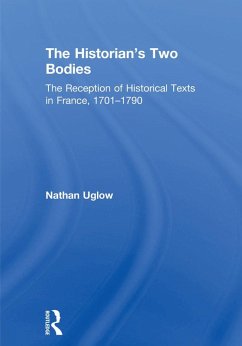The discipline of history defines itself in terms of proof not trust. However, in the eighteenth century it became embarrassingly clear that the capacity of the past to appear as a totality under the critical control of the present eluded historical practice at every stage from research to judgement and to the critical reception of that judgement. Was history a practical but uncritical resource (the 'Temple of Fame'), or a self-enclosed critical project ever shy of ultimate truth? Technical manuals and journal reviews repeatedly reasserted fundamental criteria for acceptable historical practice, but failed to eradicate confusion between coping with and exploiting the information differentials between historical actors, historians, and readers of historical texts. The Historian's Two Bodies offers a detailed analysis of this basic problem and its various repercussions for the competing perceptions of the historical task in eighteenth-century France while, importantly, denying itself any historical position free from such difficulties.
Dieser Download kann aus rechtlichen Gründen nur mit Rechnungsadresse in A, B, BG, CY, CZ, D, DK, EW, E, FIN, F, GR, HR, H, IRL, I, LT, L, LR, M, NL, PL, P, R, S, SLO, SK ausgeliefert werden.


